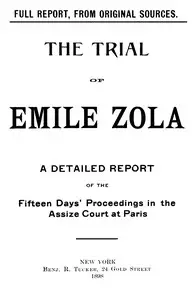"Lettres d'un Innocent: The Letters of Captain Dreyfus to His Wife" by Alfred Dreyfus, is a compilation of intimate letters penned in the late 1800s that expose the heart of a man fighting against injustice. Through heartfelt messages to his wife, Lucie, Dreyfus shares the torment of being falsely accused of treason and locked away, while also displaying his firm belief that he is innocent. As Dreyfus confronts these challenges, the letters portray someone who is deeply patriotic and a loving family man, while also showing a nation in turmoil based on one man’s plight. He writes of his heartbreak and disbelief at being labeled a traitor to the nation he loves, highlighting his determination to clear his name, as well as the solace he finds in his cherished family. Dreyfus's words capture a sense of hope shadowed by pain, revealing the deep personal scars left by a scandal that would soon captivate the world.

Lettres d'un Innocent: The Letters of Captain Dreyfus to His Wife
By Alfred Dreyfus
Accused of treason and torn from his family, a man's letters reveal his unwavering love and fight for vindication against a nation's accusations.
Summary
About the AuthorAlfred Dreyfus was a French artillery officer of Alsatian origin and Jewish ethnicity and faith. In 1894, he fell victim to a judicial conspiracy that sparked a major political crisis during the Third Republic, known as the Dreyfus Affair (1894–1906), when he was wrongfully accused and convicted, due to antisemitism, of being a spy for the German Empire. Upon his arrest, he was sentenced to degradation and deported to the penal colony on Devil's Island to be imprisoned until his death. However, evidence emerged showing that Dreyfus was innocent and that the true culprit was a Catholic officer named Esterhazy. Gradual revelations indicated that the internal investigation conducted by the army was biased; Dreyfus was an ideal scapegoat because he was Jewish, and the army's high command was aware of his innocence but preferred to cover up the affair and leave him in the penal colony rather than lose face.
Alfred Dreyfus was a French artillery officer of Alsatian origin and Jewish ethnicity and faith. In 1894, he fell victim to a judicial conspiracy that sparked a major political crisis during the Third Republic, known as the Dreyfus Affair (1894–1906), when he was wrongfully accused and convicted, due to antisemitism, of being a spy for the German Empire. Upon his arrest, he was sentenced to degradation and deported to the penal colony on Devil's Island to be imprisoned until his death. However, evidence emerged showing that Dreyfus was innocent and that the true culprit was a Catholic officer named Esterhazy. Gradual revelations indicated that the internal investigation conducted by the army was biased; Dreyfus was an ideal scapegoat because he was Jewish, and the army's high command was aware of his innocence but preferred to cover up the affair and leave him in the penal colony rather than lose face.














